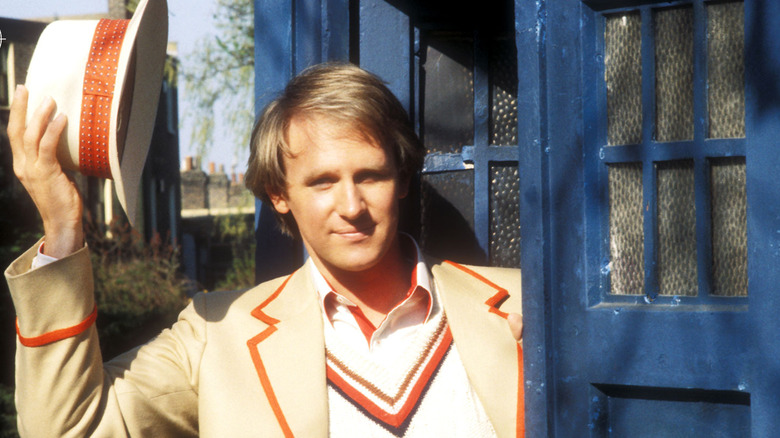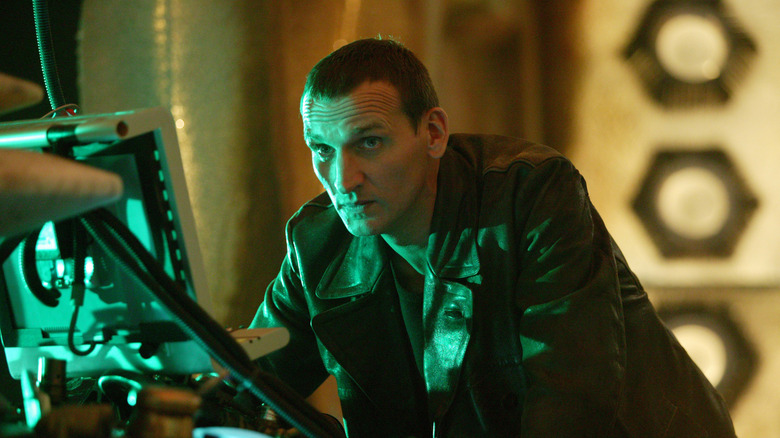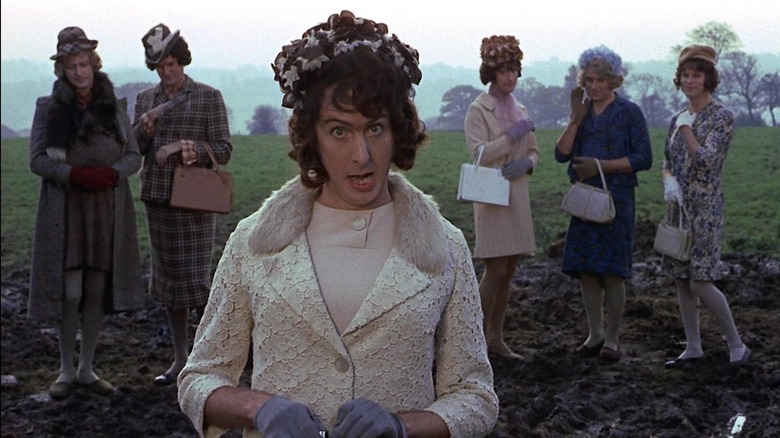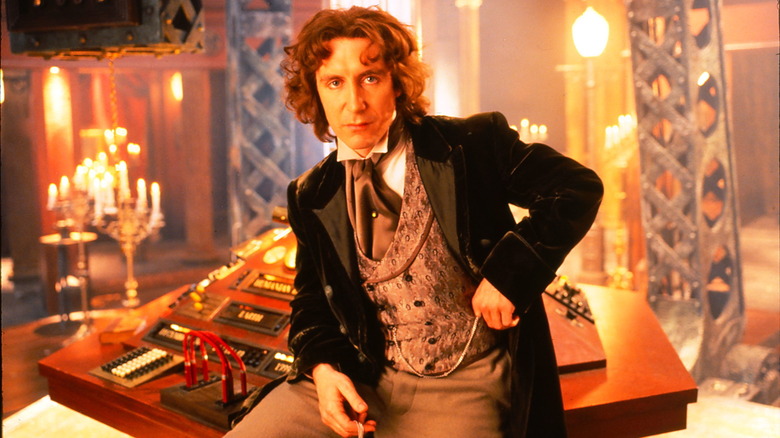That Time Steven Spielberg Almost Made A Doctor Who Movie
Just like everyone has "their" James Bond, most British people have their Doctor Who. Or just "Doctor." It's usually the actor who inhabited the part when they first came to the series at an impressionable age. My Bond was Roger Moore, because his movies always seemed to be on telly on Saturday nights and over the holidays, and my Doctor was Peter Davison, looking so young and dashing in his cricket jumper. He was sadly replaced by Colin Baker in his silly clown coat, and then Sylvester McCoy, who finally killed off any interest I had in the show. As he did the British public in general; "Doctor Who" was given the chop in 1989.
There was massive buzz when the show made its much-anticipated comeback in 2005, with Christopher Eccleston as the Doctor and former pop star Billie Piper as his new companion, Rose. Despite not really giving a monkey's about "Doctor Who," my girlfriend and I had acquired some affection for the national institution via some kind of cultural osmosis, and we eagerly watched Eccleston's one-and-done season. It was a real TV event and the reinvigorated show became a flagship title in the BBC's battle for Saturday night television ratings.
Apart from a TV movie in 1996, "Doctor Who" had been absent from our screens for 16 years. But if reports that emerged in the early '90s were true, a comeback might have happened much earlier, with a very famous American director calling the shots.
Rumors of Spielberg's Doctor Who
On December 9, 1993, The Newark Advocate announced: "Spielberg resurrects 'Dr. Who.'" Reportedly, a "BBC spokeswoman" revealed that Spielberg's Amblin Entertainment was in talks with Universal Pictures and Auntie Beeb to remake the cult TV series. By February 1994, the rumor of a Spielbergian "Doctor Who" had morphed into a "£25 million blockbuster," according to Ireland's "The Herald." Jane Seymour was apparently in the frame to become the first female Doctor, prompting the paper to run with the headline "Dr Who's Sex Change."
A few weeks before Spielberg won Best Picture and Best Director for "Schindler's List," The Sunday Times picked up the story. In typically sniffy fashion, they reported that Spielberg was "hijacking Doctor Who to Hollywood," on the brink of finalizing a deal to remake classic storylines with cutting-edge special effects in 22 one-hour episodes. Of course, they couldn't resist joking that the tech would help the Daleks overcome the obstacle of climbing stairs.
According to the Sunday Times article (all of the articles referenced throughout this post were compiled by "Who" fans here), frontrunners for the part included Tom Cruise, Dudley Moore, and Alan Rickman, although a big sticking point for fans was apparently that the 8th Doctor should be British. According to Marcus Hearn, assistant editor of Doctor Who Magazine:
"If the BBC has any sense it won't entertain the idea of an American Doctor Who. One of the things that made it so special was that he was British... Everyone is very excited, but we just hope the Americans treat the show with respect."
A week later, The Independent penned a tongue-in-cheek open letter to Spielberg (via The Independent):
"Just allow us our British eccentricities: monsters [the Daleks] that can travel through time and conquer galaxies but have to take the elevator to the second storey. Get it right, and you'll win an Oscar. Get it wrong and, in a parlance you will shortly become familiar with, you will be exterminated."
Eric Idle as Doctor Who?
The rumors persisted, and the British video game show "GamesMaster" showed an exclusive clip of a spider-like Dalek, supposedly an early test shot from Amblin, which seemed to indicate that Spielberg's "Doctor Who" remake/reboot had at least entered pre-production. As the show's host, Dominik Diamond, observed in typically irreverent fashion:
"Come on, Stevie! My pants look more like a Dalek than this."
The prospect of a Spielberg-directed "Doctor Who" was still rattling around in 1995, when the horrible tabloid "The Sun" ran the story "Eric Idle is Dr Who." Never a paper to let facts get in the way of a good story, the piece went on to say:
"Monty Python star Eric Idle is to play Dr Who in Steven Spielberg's £20 million movie version. The actor will earn £1 million as the time-traveller..."
The project finally appeared to meet its demise in June 1995 when the Daily Express reported that the BBC were developing a TV movie after Spielberg failed to convince American execs to remake the series with Idle and ... hold onto your butts ... Pamela Anderson as his companion. It appears that the Express were merging rumors of two different potential "Doctor Who" movies. More on that later.
All these articles seemed to lean into the idea that Spielberg would direct the thing, whether as a movie or a TV series. I think it's more likely that he was looking for existing IPs for Amblin Television to develop, like "The Young Indiana Jones Chronicles" from around the same time.
The Spielberg Involvement Falls Through
While the Amblin deal ultimately fell through, the BBC went ahead with a co-production with Universal to make a 1996 TV film starring Paul McGann, best known for the boozy cult classic, "Withnail and I." The project was reportedly a "backdoor pilot" to break into the U.S. audience. Fox Network were the potential takers, but were only interested in making a TV movie. Producer Philip Segal and his team hoped that Fox might consider backing a series if it was successful, but the film didn't perform well enough with American viewers to warrant taking it any further.
The BBC's deal with Universal for the TV movie led to a lawsuit for £14 million filed against them in 1997 by Daltenreys Limited, a consortium founded 10 years earlier by businessmen Peter Litton, George Dugdale, and John Humphreys, including high-profile investors like Roxy Music frontman Bryan Ferry and Dire Straits guitarist John Illsley. They claimed that the BBC had "blatantly breached" an agreement with them. The Daltenreys spent £400,000 of their own cash to acquire the rights to "Doctor Who," with the caveat that any film made must stand alone from the TV series. They struggled to get the financial backing they needed and, even after renewing their option on the IP, all rights were due to revert to the BBC in April 1994.
In 1993, the consortium finally struck a deal with Lumiere Pictures for three films, with Leonard Nimoy approached to direct, Alan Rickman offered the part of the Doctor, and possibly Pamela Anderson as his companion. They were reportedly "poised" to announce the project when the BBC nipped in with their own film version (via The Independent). The BBC pledged to fight the court case, arguing that the rights had reverted to them because the Daltenreys were unable to get the project off the ground.
Whatever the truth, the idea of Hans Gruber and the star of "Barb Wire" at the TARDIS controls remains one of the most intriguing might-have-happened remakes ever. With or without Spielberg involved.



